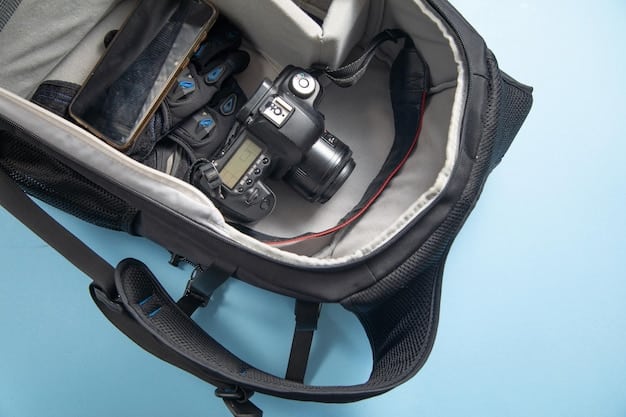Family Travel Photography: Tips to Capture Vacation Memories

Unlock the secrets to stunning family travel photography with our simple tips, ensuring you capture unforgettable vacation memories that will last a lifetime.
Planning a family trip? Don’t forget your camera! This article provides simple yet effective tips for family travel photography: Capture Stunning Vacation Memories with These Simple Tips, giving you frame-worthy photos and everlasting stories.
before you go: planning your family travel photography
The anticipation of a family trip is a beautiful thing. Preparing adequately, especially concerning your photography, ensures those precious moments are timelessly preserved.
Research Destinations and Photo Opportunities
Before you even pack your bags, spend some time researching your destination. What iconic landmarks or hidden gems are worth capturing? What kind of lighting can you expect at different times of the day?
- Optimal Times: Identify the best times (golden hour, blue hour) for capturing stunning landscapes.
- Local Customs: Be aware of any cultural sensitivities regarding photography in certain locations.
- Accessibility: Check for any permits or restrictions on photography at popular spots.
Gears up: choosing the right camera equipment
Selecting the right equipment significantly impacts the quality and ease of capturing those memorable family moments. A bulky DSLR might offer professional image quality, but its utility diminishes if it’s too cumbersome to carry around.

- Camera Type: Consider the pros and cons of DSLRs, mirrorless cameras, and even smartphones.
- Lenses: A versatile zoom lens can cover many shooting situations, but a wide-angle lens is fantastic for landscapes and group shots.
- Accessories: Don’t forget extra batteries, memory cards, and a comfortable camera strap.
Planning your photography in advance allows you to focus on enjoying your family vacation while ensuring those precious moments are beautifully captured.
mastering light: essential tips for family travel photos
Lighting can make or break a photograph. Being attuned to the nuances of light and how it interacts with your subjects can transform an ordinary snapshot into a breathtaking memory.
The Golden Hour Magic
The golden hours are short periods just after sunrise and just before sunset. During these times, the sun casts a warm, soft light that flatters faces and landscapes alike.
- Plan Shoots: Arrange your outdoor photography during these magic hours for the best results.
- Soft light: Take advantage of the warm light to capture stunning family portraits without harsh shadows.
- Enhance Landscapes: Watch how landscapes are transformed by the golden light, adding depth and warmth to your photos.
Dealing with Harsh Light
Not all travel happens during optimal lighting conditions. Midday sun can be particularly challenging, creating harsh shadows and overexposed areas.

* Seek Shade: Utilize natural shade from trees, buildings, or umbrellas to diffuse the harsh light.
* Reflectors: A simple reflector can bounce light back onto your subject’s face, filling in shadows.
* Fill Flash: Using a fill flash can lighten shadows and balance the exposure, especially in backlit situations.
Adjusting your approach to harness the power of lighting will undoubtedly elevate your family travel photography, ensuring your photos reflect the beauty of each moment.
composition techniques: framing your family memories
Composition is the art of arranging elements within a frame to create a visually appealing and engaging photograph. Mastering a few basic composition techniques can transform your snapshots into compelling stories.
Rule of Thirds
The rule of thirds involves dividing your frame into nine equal parts using two horizontal and two vertical lines. Placing key elements along these lines or at their intersections creates a balanced and interesting image.
Leading Lines
Leading lines are visual pathways that draw the viewer’s eye into the photograph. Roads, rivers, fences, or even a row of trees can serve as leading lines, adding depth and direction to your composition.
Framing
Using elements within the scene to frame your subject can add depth and focus to the photo. Archways, windows, tree branches, and even natural rock formations can serve as frames, drawing attention to the main subject.
Implementing these composition techniques can enhance the storytelling aspect of your family travel photos, inviting viewers to immerse themselves in your family’s experiences.
candid moments vs. posed shots: striking the balance
Balancing candid moments with posed shots is essential for capturing the full spectrum of your family’s travel experiences. While posed shots can create beautiful portraits, candid moments often reveal genuine emotions and spontaneous interactions.
The Art of Candid Photography
Candid photography involves capturing spontaneous moments without directing or staging the scene. These shots often feel more authentic and personal.
* Be Discrete: Try to blend into the background as much as possible. Avoid making eye contact or drawing attention to yourself.
* Continuous Shooting: Use continuous shooting mode to capture a series of images, increasing your chances of getting that perfect candid moment.
* Anticipate Moments: Pay attention to your family’s interactions and anticipate moments of laughter, affection, or surprise.
Making Posed Shots Fun
Posed shots don’t have to feel stiff or artificial. With a bit of creativity and spontaneity, you can create posed photos that reflect your family’s personality and bond.
* Choose Scenic Backdrops: Opt for picturesque locations that complement your family’s attire and style.
* Incorporate Activities: Instead of standing still, engage in activities like walking, running, or playing games.
* Encourage Interaction: Ask your family members to interact with each other naturally, such as hugging, laughing, or telling jokes.
Finding the sweet spot between candid and posed shots ensures a diverse collection of travel photos that truly represent your family’s unique adventures.
storytelling through photos: creating a visual narrative
Photography is more than just capturing images; it’s about telling stories. Each photo should contribute to a larger narrative that reflects your family’s travel experience.
Focus on Details
Pay attention to the small details that capture the essence of your trip. These can include architectural elements, local cuisine, unique souvenirs, or even the patterns and textures of the environment.
- Document the Journey: Don’t just focus on the destinations; capture the journey itself, including mode of transport, meals, and landscape.
- Human Element: Capture genuine emotions, interactions with locals, and shared laughter.
- Uncommon Views: Search for different perspectives and unusual angles.
Create Photo Series
Consider creating photo series that focus on specific themes or activities. This could include a series of portraits, a series of food photos, or a series of landscape shots.
Documenting your travels like real storytellers will provide context and emotion to your photos.
editing and organizing: preserving your memories
Editing is a vital step in the photography process. A little post-processing can transform your images.
Basic Editing Techniques
Simple adjustments to brightness, contrast, and color balance can drastically improve your photos. Use photo editing software like Adobe Lightroom, Snapseed, or VSCO to make these adjustments.
* Color Correction: Fix any color casts or imbalances to make your photos look more natural.
* Cropping: Adjust the composition and remove distractions.
* Filters and Presets: Use filters and presets sparingly to enhance the overall mood and style of your photos.
Organizing Your Photos
Establish a clear organizational system to store your photos and make them easy to find.
* File Naming: Use descriptive file names that include the date, location, and event.
* Folders and Subfolders: Create folders for each trip and subfolders for specific locations or activities.
* Backup: Always back up your photos to multiple locations, such as an external hard drive and a cloud storage service.
Well-edited photos combined with an organized system will ensure you treasure the memories for a long time.
| Key Point | Brief Description |
|---|---|
| 📸 Planning Ahead | Research destinations, identify photo spots, and prep your camera gear. |
| ☀️ Mastering Light | Utilize the golden hour, seek shade in harsh light, and use reflectors/fill flash. |
| 🖼️ Composition | Apply the rule of thirds, use leading lines, and frame your shots for depth. |
| 😊 Candid Moments | Capture candid interactions and spontaneous expressions for authentic memories. |
[Frequently Asked Questions]
▼
The best camera depends on your needs. Smartphones are convenient, mirrorless cameras offer great quality in a compact size, and DLSR’s give you manual control.
▼
Increase ISO, use a wider aperture, and stabilize the camera. You can also use editing tools to brighten dark spots without adding distortion.
▼
Adjusting brightness and contrast, color correction, cropping to refine your composition will make your memories appear as you remember.
▼
Be patient, interactive, and unobtrusive. Capture candid moments and make it fun for children—try to incorporate play and adventure!
▼
Focus on details, create a photo series, document the journey, or capture all of that through a video montage and upload onto social media!
Conclusion
Creating lasting family memories is easy with these simple to understand tips. Don’t worry about being a professional, just focus on what makes your family unique, and the precious memories will capture themselves.





